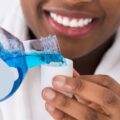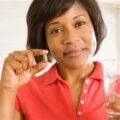Mouthwash is a liquid product used to rinse your teeth, gums, and mouth. There are several brands of mouth wash, they usually contain an antiseptic to kill harmful bacteria that can live between your teeth and on your tongue. Some people use mouthwash to fight against bad breath, while others use it to try to prevent tooth decay.
Mouthwash doesn’t replace brushing your teeth or flossing in terms of oral hygiene, and it’s only effective when used correctly. It’s also important to understand that different product formulas contain different ingredients, and not all mouthwashes can strengthen your teeth.
What Happens If You Swallow Mouthwash?
If you, or a child, should swallow a small amount of fluoride mouthwash (or any other type), there’s no reason to panic, but do take care to avoid it happening again by taking some of these steps:
Supervise Children: Don’t let children use a mouthwash unsupervised. It has been recommended that children between ages 6 and 12 need to be supervised when they use a mouthwash. Many companies use child-resistant caps to help you out. Be sure they spit it out. Children younger than 6 years may have trouble controlling the swallowing reflex, so mouthwash is not recommended for young children.
Pay Attention: Don’t let family members distract you when you’re performing your oral care routine; distraction might make you forget to spit and you may swallow the mouthwash by mistake. Go into the bathroom and shut the door.
What to Do If You Swallow A Lot of Mouthwash
Swallowing small amounts of mouthwash may leave you feeling a bit queasy or may even cause diarrhea, but these symptoms should pass. However, if your child or someone you know overdoses on mouthwash by drinking and swallowing a large amount, take these steps:
Check The Label: Check to see which of these potentially poisonous products the mouthwash contains: fluoride or ethanol. Severe symptoms of a mouthwash overdose related to these ingredients may include dizziness, drowsiness, trouble breathing, or, in serious cases, convulsions or a coma. In severe cases, head for the emergency room, and bring the mouthwash bottle with you if possible.
Seek Help: Call the National Poison Control Center at 1-800-222-1222 for quick, confidential help. Do not try to make the person who swallowed the mouthwash vomit it up. Instead, be sure you have information about the victim’s age, weight, and the type and amount of product swallowed. It’s very important to have the product close by so you can tell the operator the specific ingredients.





